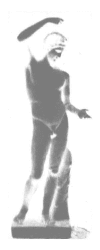 This site is going back to experimental studies on internet-semiotics in the early 90s, with a comparative focus on early (preclassic) european ontology.
This site is going back to experimental studies on internet-semiotics in the early 90s, with a comparative focus on early (preclassic) european ontology.
While name (transliterated from "Flächenland") and semantic divergence - no commerce, straight education, information, illustration, art or science here - may suggest associations with Abbot's satiric social-math novel "Flatland. A Romance of Many Dimensions" (1884), there are substantial differences in perspectivity.
Consequently, already the German plural form ("Flächen") is breaking up the Victorian title, with respect to morpho-logical, political, semiotic reasons. Mathematics are in a material sense ubiquitary, nowadays, while epistemics have significantly changed, and the satiric approach on social reflexivity has somehow grown "serious" (would you suggest Irony against symptoms like "Trumpism" ... ?).
Abbot may then be regarded as a strange, cynic illustration of Einstein's dictum ("Der Horizont vieler Menschen ..."), while these days the universe "itself" acceptably seems to be "flat" (large-scale-Eucledian), questions of visibility strangely ruled my media and "information". Do we need something like a unified, perspectivic, universal history of "flatness" ?
![]() Early european (especially: ancient greek) times, overlayed and transcribed by Mid-Ages, have always been a cultural and intellectual reference and refreshment for later times (cf. "Renaissance", "Age of Reason" or "Enlightment").
Early european (especially: ancient greek) times, overlayed and transcribed by Mid-Ages, have always been a cultural and intellectual reference and refreshment for later times (cf. "Renaissance", "Age of Reason" or "Enlightment").
The universal "Big-Bang" of mid-millennium BC shows the emergence of central, generic european thoughts, media and institutions like logos, nature, art and science in their (later "classic") self-referential forms, the delphic Γνῶθι σαυτόν like a common, individualizing, identifying research-program.
While these demanding, paradoxical "platform-roots" serve as internal (autopoietic) reference for cultural activity since then, the meaning of universality is a discrete, autonomous concern with several facets; obviously the laws of physics are not in the same sense (applicable context) "universal" as principles of visualization, moral or social systems are. But what does this mean ?
Some of these facets are further treated here (on this site) - in varying project contextes - connected with system theory and cultural semiotics - scaled to specific, transformative, localized interests - in a more or less explorative, shared, distributive or experimental way. From a pragmatistic point of view: reflected roots are potential new habits.


blue
1992

Videobauer
1994

grass
1996
E6

change
1996

america online
1996

schirm
1996

greek turn
1996

euro
1996

huserliana
1996